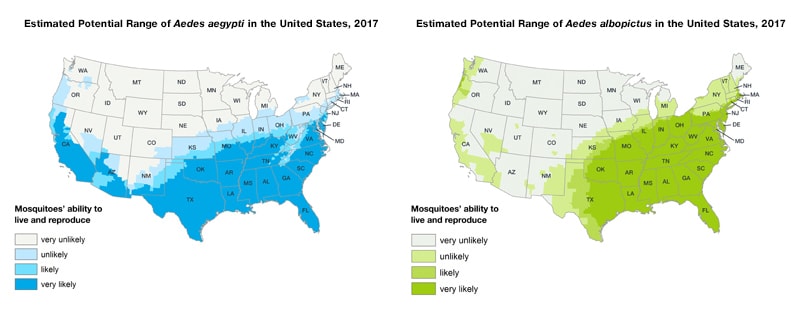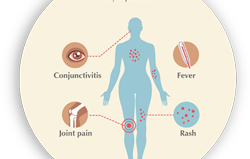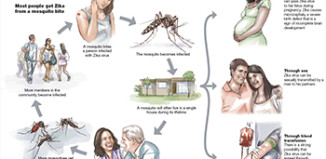Integrated Mosquito Management ( Zika Virus)
Integrated Mosquito Management for Aedes aegypti and Aedes albopictus mosquitoes
Local governments and mosquito control programs often use an integrated mosquito management (IMM) or integrated vector management (IVM) approach to control mosquitoes. IMM uses a combination of methods to prevent and control mosquitoes that spread viruses, like Zika, dengue, and chikungunya. IMM is based on an understanding of mosquito biology, the mosquito life cycle, and the way mosquitoes spread viruses. IMM uses methods that, when followed correctly, are safe and have been scientifically proven to reduce mosquito populations.
Everyone can help control mosquitoes.
- Professionals from local government departments or mosquito control districts develop mosquito control plans, perform tasks to control young and adult mosquitoes, and evaluate the effectiveness of actions taken.
- You, your neighbors, and the community can also take steps to reduce mosquitoes in and around your home and in your neighborhood.
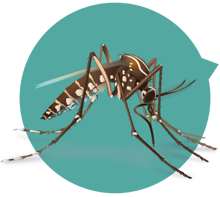
Conduct mosquito surveillance
Mosquito control plans include steps that are taken before control efforts begin and before people start getting sick with a virus spread by mosquitoes. Professionals need to understand what types and numbers of mosquitoes are in an area. In order to find out this information, mosquito control experts conduct surveillance. Surveillance activities can include:
- Monitoring places where adult mosquitoes lay eggs and where young mosquitoes can be found
- Tracking mosquito populations and the viruses they may be carrying
- Determining if EPA-registered insecticides will be effective
These activities help professionals determine if, when, and where control activities are needed to manage mosquito populations before people start getting sick. If professionals discover that local mosquitoes are carrying viruses (like dengue, Zika, or others), they start implementing other activities identified in their mosquito control plans.

Remove places where mosquitoes lay eggs
Removing places where mosquitoes lay eggs is an important step. Mosquitoes lay eggs near water because young mosquitoes need water to survive. Professionals and the public can remove standing water.
- Professionals at local government agencies and mosquito control districts may collect and dispose of illegally dumped tires, clean up and maintain public spaces like parks and greenways, and clean up illegal dumps and roadside trash.
- You, your neighbors, and community can remove standing water. Once a week, items that hold water like tires, buckets, planters, toys, pools birdbaths, flower pot saucers, and trash containers should be emptied and scrubbed, turned over, covered, or thrown away.
- If needed, a community clean up event can be held to remove large items like tires that collect water.
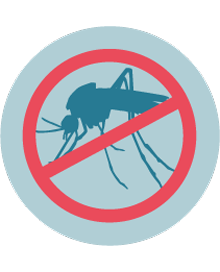
Control young mosquitoes
Once mosquito eggs hatch, they become larvae and then pupae. Both larvae and pupae live in standing water. Dumping or removing standing water in and around your home is one way to control young mosquitoes. For standing water that cannot be dumped or drained, a larvicide can be used to kill larvae. Larvicides[PDF – 1 page] are products used to kill young mosquitoes before they become biting adults.
The public and professionals can use US Environmental Protection Agency (EPA)-registered larvicides according to label instructions.
- Professionals treat water-holding structures and containers in public places, like storm drains or urns in cemeteries. They may also treat standing water on private property as part of a neighborhood cleanup campaign.
- People can treat fountains, septic tanks, and pool covers that hold water with larvicides.
Controlling young mosquitoes before they become adults, can minimize widespread use of insecticides that kill adult mosquitoes.
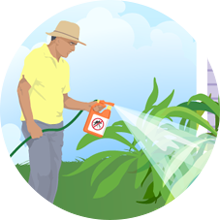
Control adult mosquitoes
Adult mosquitoes can spread viruses (like dengue, Zika, or others) that make you sick. When surveillance activities show that adult mosquito populations are increasing or that they are spreading viruses, professionals may decide to apply to kill adult mosquitoes. Adulticides help to reduce the number of mosquitoes in an area and reduce the risk that people will get sick. The public and professionals can use US Environmental Protection Agency (EPA)-registered adulticides according to label instructions.
- If mosquitoes are spreading viruses over larger areas, professionals spray adulticides by using backpack sprayers.
- People can buy adulticides and use them inside and outside their homes.
Monitor control programs
To make sure that mosquito control activities are working, professionals monitor the effectiveness of their efforts to control both young and adult mosquitoes. For example, if an insecticide didn’t work as well as predicted, then professionals may conduct additional studies on insecticide resistance or evaluate the equipment used to apply insecticides..


